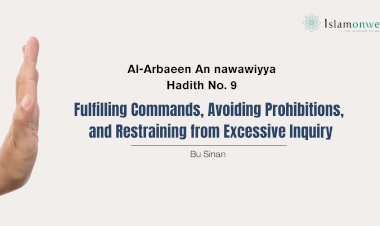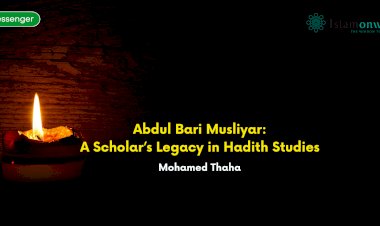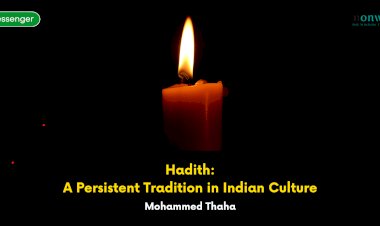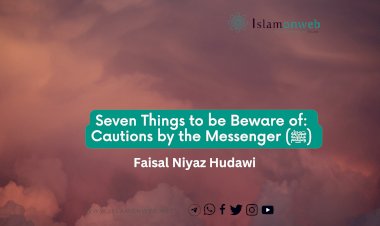Hadith No. 13 : Loving for Others What You Love for Yourself
عَنْ أَبِي حَمْزَةَ أَنَسِ بْنِ مَالِكٍ رضي الله عنه خَادِمِ رَسُولِ اللَّهِ صلى الله عليه وسلم: أَنَّ رَسُولَ اللَّهِ صلى الله عليه وسلم قَالَ:
"لَا يُؤْمِنُ أَحَدُكُمْ حَتَّى يُحِبَّ لأَخِيهِ مَا يُحِبُّ لِنَفْسِهِ"
رَوَاهُ الْبُخَارِيُّ وَمُسْلِمٌ
Translation
On the authority of Abū Ḥamzah Anas ibn Mālik (raḍiya Allāhu ʿanhu), the servant of the Messenger of Allah ﷺ, who said:
The Messenger of Allah ﷺ said:
“None of you truly believes until he loves for his brother what he loves for himself.”
Narrated by al-Bukhārī[1] and Muslim[2].
The Narrator: Anas ibn Mālik (raḍiya Allāhu ʿanhu)
Anas ibn Mālik ibn al-Naḍr al-Anṣārī al-Khazrajī al-Najjārī belonged to the clan of Banū ʿAdī ibn al-Najjār. He is famously known as the servant of the Messenger of Allah ﷺ, a title he proudly carried throughout his life. His kunyah was Abū Ḥamzah, and he would often be remembered simply as Khādim Rasūl Allāh ﷺ.
Anas was born ten years before the Hijrah. His mother, the noble Umm Sulaym bint Milḥān (raḍiya Allāhu ʿanhā), was among the earliest women of Madinah to embrace Islam. Her husband, Mālik ibn al-Naḍr, rejected Islam and left for Syria, where he passed away. Later, Umm Sulaym married Abū Ṭalḥah al-Anṣārī (raḍiya Allāhu ʿanhu), one of the prominent Companions.
When the Prophet ﷺ migrated to Madinah, Umm Sulaym brought her young son Anas, then just a boy of ten years old, and presented him to the Prophet ﷺ, saying:
“O Messenger of Allah, this is my little Anas, my intelligent son who can write. I have brought him to serve you. Please supplicate to Allah for him.”
The Prophet ﷺ accepted him warmly, prayed for him, and thus began a lifelong bond of love, service, and learning.
For the next ten years, Anas served the Prophet ﷺ in Madinah. He himself testified: “The Messenger of Allah ﷺ never scolded me for something I did, nor did he ever strike me.” Sometimes the Prophet ﷺ would affectionately call him “Yā Bunayya” (O my little son). This gentle companionship shaped Anas into one of the most insightful transmitters of the Prophet’s Sunnah.
Though only a boy at the time, Anas was not distant from the great events of the new Muslim community. He accompanied the Prophet ﷺ to Badr, serving though not fighting due to his age. He later witnessed Uḥud, Khandaq, and joined the Prophet ﷺ in eight expeditions, including Khaybar, Ḥunayn, and Ṭāʾif. He was also present at Ḥudaybiyyah, ʿUmrat al-Qaḍāʾ, the Conquest of Makkah, Bayʿat al-Riḍwān under the tree, and the Farewell Pilgrimage (Ḥajjat al-Wadāʿ).
Anas lived a long life after the Prophet’s passing, settling eventually in Baṣrah, where he became one of its leading scholars and narrators of ḥadīth. He is counted among the seven prolific narrators (al-mukthirūn), transmitting more than 2,200 aḥādīth, of which both al-Bukhārī and Muslim agreed upon 168[3].
He passed away around 90–93 AH, nearly a century old, and was the last Companion to die in Baṣrah. Before his death, he instructed his student Thābit al-Bannānī to place under his tongue a strand of the Prophet’s hair that he had preserved — a final act of love for the Messenger ﷺ whom he had served as a boy and cherished as a lifelong guide.
Anas ibn Mālik (raḍiya Allāhu ʿanhu) thus remains one of the greatest witnesses to the Prophet’s daily life, embodying the Sunnah in both word and deed.
Explanation
The previous ḥadīth spoke about the beauty of Islam lying in leaving aside what does not concern one. This ḥadīth, however, moves a step further and describes how faith itself becomes complete. It presents the very essence of human dealings and interactions: a believer cannot attain the perfection of īmān until he loves for his brother what he loves for himself, and dislikes for him what he dislikes for himself.
This principle, simple yet profound, builds the foundation of a society rooted in compassion, fairness, and mutual respect.
The word “Akh” (أخ) — meaning brother — appears frequently in both the Qur’an and the ḥadīth. Its usage varies, sometimes referring specifically to brotherhood in Islam[4], and at other times extending more broadly to brotherhood in humanity[5]. In this ḥadīth, the term is expansive enough to accommodate both understandings, each carrying its own rights and obligations: the believer owes his fellow Muslim the bond of faith, and he owes his fellow human being the bond of humanity and justice.
This inclusiveness is further clarified by other narrations in which the Prophet ﷺ used the word “al-nās” (الناس), meaning “people” in general, instead of “akh.” Such wording opens the teaching beyond the Muslim community to embrace all of humankind, calling believers to wish for others the good they desire for themselves — whether guidance, well-being, or worldly blessings.
Other sayings of the Prophet ﷺ reinforce this teaching. To Abū Hurayrah (raḍiya Allāhu ʿanhu), he said:
«أَحِبَّ للنَّاسِ ما تُحِبُّ لنَفْسِكَ تَكُنْ مُسْلِمًا»
“Love for people what you love for yourself, and you will be a true Muslim.”
(al-Tirmidhī, Ibn Mājah)
When Muʿādh ibn Jabal (raḍiya Allāhuʿanhu) asked about the best of faith, the Prophet ﷺ replied:
“The best of faith is to love for the sake of Allah, to hate for the sake of Allah, and to keep your tongue moist with the remembrance of Allah.”
He then added:
“That you love for people what you love for yourself, dislike for them what you dislike for yourself, and that you speak good or remain silent.”[6]
Taken together, these narrations make clear that the perfection of īmān is not achieved through private worship alone. It shines forth in how a believer relates to others: in goodwill, sincerity, and wishing for them the very same good he seeks for himself. This is the spiritual ethic that turns faith from a private matter into a force that binds hearts and societies together.
The ḥadīth is not denying faith in its entirety, but showing that true īmān is only realised when this quality takes root in one’s heart.
Ibn Rajab clarifies[7]:
“The intended meaning is that among the obligatory traits of faith is that a believer loves for his brother what he loves for himself, and hates for him what he hates for himself. If this quality is absent, then his īmān is deficient.”
From this teaching, scholars noted that the most blameworthy state of a person is when he grudges his brother's acts of goodness if he himself was not granted them. This was the case of the son of Ādam who killed his own brother simply because Allah accepted his brother’s offering and not his own[8].
The “similarity” (al-mithliyya) intended in the ḥadīth is not that one must literally want others to be equal in every way, but rather that one should grant others the same protection from harm and freedom from dislike that he seeks for himself. Just as a person naturally wants to receive justice for any wrong done to him, he should also hasten to give justice to his brother if he has wronged him — even if doing so is difficult for his own soul.
This principle is supported by the Prophet’s ﷺ saying:
“Look at what you would love people to do for you, then do the same for them.”
A practical example of this comes from the wise Companion al-Aḥnaf ibn Qays. When asked, “From whom did you learn forbearance?” he replied, “From myself.” They said, “How so?” He said, “Whenever I disliked something from another, I made sure never to do the same to anyone else.”
At the same time, this teaching does not mean that a person should stop wishing for personal excellence or to be among the best of people. It only means he must not begrudge others the good he desires for himself. Indeed, the more complete state is the opposite — to wish that others excel beyond oneself.
Hence, the hadith calls us to purify the heart from ghill (malice) and ḥasad (envy), until we are content that Allah’s bounty can be shared widely without limit.
Degrees of Application
The Prophet’s teaching in this ḥadīth can be lived on different levels, each reflecting the depth of īmān in the heart:
1. The Minimum Level: Refraining from Harming Others
The first and most basic degree is to avoid harming others in word or deed. Just as a person dislikes being cheated, insulted, or wronged, he must hold back from inflicting the same on others. This is the foundation of justice and safety in society.
The Prophet ﷺ said:
«المسلم من سلم المسلمون من لسانه ويده»
“A Muslim is the one from whose tongue and hand the Muslims are safe.”[9]
And in another narration, Abū Hurayrah (raḍiya Allāhu ʿanhu) reported that the Prophet ﷺ repeated three times:
«والله لا يؤمن، والله لا يؤمن، والله لا يؤمن»
By Allah, he does not believe! By Allah, he does not believe! By Allah, he does not believe!” They asked: “Who, O Messenger of Allah?” He said:
«الذي لا يأمن جاره بوائقه»
“The one from whose harm his neighbour is not safe.”[10]
Here, the Prophet ﷺ is is emphasising — with repetition and an oath — that such a person does not have complete and perfect faith. His īmān is deficient because his behaviour contradicts the ethics of Islam, especially when his neighbour does not feel safe from his harm. This shows that harming others, even in small ways, is a violation of īmān. Even when one cannot actively benefit others, ensuring that one does not harm them is the least requirement of faith.
2. The Higher Level: Wishing Good for Others as Much as for Oneself
Beyond refraining from harm, the believer should actively desire for others what he desires for himself — guidance, blessings, health, provision, and forgiveness. It calls us to genuinely wish for others the same good we choose for ourselves. This is not possible unless the heart is free from envy, malice, and ill-will. How can a person sincerely want blessings for his brother if he resents seeing him blessed?
ʿAbd Allāh ibn ʿAmr (raḍiya Allāhu ʿanhu) reported:
It was said to the Messenger of Allah ﷺ: “Which of the people are best?”
He replied:
“Every person who is pure of heart (makhmūm al-qalb) and truthful in speech.”
They said: “We know the one who is truthful in speech, but who is the pure of heart?”
He said:
“It is the one who is pious and pure, in whose heart there is no sin, no transgression, no malice, and no envy.”[11]This purity of heart is what allows a believer to look at his brother’s success and say, “Alḥamdulillāh, may Allah increase him.” It is what makes him rejoice at others’ prosperity as he would at his own, for he knows that Allah’s bounty is vast and undiminished by sharing. Without such a cleansed heart, a person may outwardly refrain from harming others but inwardly begrudge them every blessing.
Thus, the higher level of īmān — loving for others what one loves for oneself — is built upon this very quality: a heart swept clean of envy and filled with goodwill. It is only with such a heart that the believer can rise beyond selfishness into the brotherhood and compassion that this ḥadīth demands.
3. The Highest Level: Preferring Others Over Oneself (Īthār)
The most excellent stage is to go beyond equality and actually give preference to others, even at personal cost. This is the quality of Īthār — the pinnacle of faith where selflessness overcomes natural self-interest.
The scholars divided it into two kinds:
- Īthār in Worldly Matters
When it comes to the needs of this world — food, clothing, shelter, or comfort — preferring others is not only allowed, but praiseworthy. It reflects generosity, compassion, and freedom from selfishness.
Allah praised the Anṣār for this very quality, saying:
{وَالَّذِينَ تَبَوَّءُوا الدَّارَ وَالْإِيمَانَ مِنْ قَبْلِهِمْ يُحِبُّونَ مَنْ هَاجَرَ إِلَيْهِمْ وَلَا يَجِدُونَ فِي صُدُورِهِمْ حَاجَةً مِمَّا أُوتُوا وَيُؤْثِرُونَ عَلَى أَنْفُسِهِمْ وَلَوْ كَانَ بِهِمْ خَصَاصَةٌ وَمَنْ يُوقَ شُحَّ نَفْسِهِ فَأُوْلَٰئِكَ هُمُ الْمُفْلِحُونَ}
“And those who, before them, had settled in Madinah and had adopted the faith, love those who emigrated to them, and find not any want in their breasts of what the emigrants were given, but give them preference over themselves, even though they are in need. And whoever is saved from the greed of his own soul – it is they who will be successful.” (al-Ḥashr 59:9)
This form of īthār is a hallmark of noble character, and a fruit of strong īmān.
It is narrated that a man came to the Prophet ﷺ hungry, and the Prophet ﷺ asked who would host him. An Anṣārī man took him home despite having little food. He and his wife dimmed the lamp and pretended to eat with their children, leaving the meal for the guest. Allah revealed the verse above in praise of this act of selfless Īthār (Muslim).
- Īthār in Religious Acts
When it comes to acts of worship and drawing near to Allah, however, preferring others over oneself is disliked. Why? Because the Qur’an commands us to race toward good deeds:
- {سَابِقُوا إِلَى مَغْفِرَةٍ مِنْ رَبِّكُمْ} — “Race towards forgiveness from your Lord.” (al-Ḥadīd 57:21)
- {وَفِي ذَٰلِكَ فَلْيَتَنَافَسِ الْمُتَنَافِسُونَ} — “So in that, let those who compete, compete.” (al-Muṭaffifīn 83:26)
The spirit of these verses is that each believer should long to be first in obedience and closest to Allah, without willingly giving up that opportunity for someone else.
Imām al-Nawawī says: “Īthār is disliked in acts of worship, unlike in worldly affairs, where it is beloved.”[12]
Thus, the believer lives between two attitudes:
- In worldly matters, he is generous, preferring others even at his own expense.
- In spiritual matters, he is ambitious, eager to outstrip others in devotion and obedience to Allah.
This balance prevents two extremes — selfishness in worldly life, and negligence in the pursuit of nearness to Allah.
Conclusion
This ḥadīth lays down a vital principle that the perfection of faith is not merely in worship or ritual, but in the way a believer relates to others.
A striking example of this teaching in practice is found in the story of the young man who came to the Prophet ﷺ asking for permission to commit zina. The Companions were quick to rebuke him, but the Prophet ﷺ gently drew him close and appealed to his sense of empathy: “Would you like it for your mother? Your daughter? Your sister? Your aunt?” To each, the young man replied in horror, “No, by Allah, may Allah make me your ransom.” The Prophet ﷺ then said: “And neither do people like it for their mothers, daughters, sisters, or aunts.” Finally, he placed his blessed hand on him and supplicated: “O Allah, forgive his sin, purify his heart, and guard his chastity.” From that day onward, the young man no longer turned to such desires[13].
This incident shows how the Prophet ﷺ instilled the ethic of this ḥadīth — that true īmān means extending to others the same dignity, safety, and blessings we want for ourselves and our families. If a person truly internalises this, he will never harm another, for he knows that what he detests for his own loved ones, others equally detest for theirs.
Thus, the perfection of faith is found in a heart that is purified of envy and selfishness, and a soul that sincerely desires for all people the good it seeks for itself. This is the path to building a society of compassion, trust, and harmony, a society that reflects the mercy of the Prophet ﷺ.
References:
[1] Ṣaḥīḥ al-Bukhārī, Kitāb al-Īmān, ḥadīth no. 13
[2] Ṣaḥīḥ Muslim, Kitāb al-Īmān, ḥadīth no. 45
[3] Ibn Ḥajar al-Haytamī (d. 974 AH), al-Fatḥ al-Mubīn bi-Sharḥ al-Arbaʿīn, p. 305
[4] For brotherhood in faith: {إِنَّمَا الْمُؤْمِنُونَ إِخْوَةٌ} — “The believers are but brothers.” (al-Ḥujurāt 49:10).
[5] For brotherhood in humanity: {وَإِلَىٰ عَادٍ أَخَاهُمْ هُودًا} — “And to ʿĀd, [We sent] their brother Hūd.” (al-Aʿrāf 7:65).
[6] Aḥmad
[7] Ḥ (d. 795 AH), in Jāmiʿ al-ʿUlūm wa’l-Ḥikam (1/327
[8] Sūrat al-Māʾidah (5:27)
[9] (al-Bukhārī, Muslim)
[10] (Muttafaqun ʿalayh)
[11] Ibn Mājah 4216
[12] al-Nawawī, Yaḥyā ibn Sharaf (d. 676 AH). al-Tibyān fī Ādāb Ḥamalat al-Qur’ān, p. 51.
[13] Aḥmad
Disclaimer
The views expressed in this article are the author’s own and do not necessarily mirror Islamonweb’s editorial stance.
2 Comments
-

: "لَا يُؤْمِنُ أَحَدُكُمْ حَتَّى يُحِبَّ لأَخِيهِ مَا يُحِبُّ لِنَفْسِهِ" رَوَاهُ الْبُخَارِيُّ وَمُسْلِمٌ A very useful post. I truly thank you for the information contained in this article. <a href="https://www.univ-msila.dz/site/shs/">Departement of Sharia </a> <a href="https://www.univ-msila.dz/site/shs-ar/"> Departamento de Sharia </a> https://www.univ-msila.dz/site/shs-ar/ https://www.univ-msila.dz/site/shs/
-

On the authority of Abū Ḥamzah Anas ibn Mālik (raḍiya Allāhu ʿanhu), the servant of the Messenger of Allah ﷺ, who said: The Messenger of Allah ﷺ said: “None of you truly believes until he loves for his brother what he loves for himself.” Narrated by al-Bukhārī[1] and Muslim[2]. Very nice post. I just stumbled upon your blog and wanted to say that I've truly enjoyed surfing around your blog posts. <a href="https://www.univ-msila.dz/site/shs/">Departement of Sharia </a> <a href="https://www.univ-msila.dz/site/shs-ar/"> Departamento de Sharia </a> https://www.univ-msila.dz/site/shs-ar/ https://www.univ-msila.dz/site/shs/
























Leave A Comment